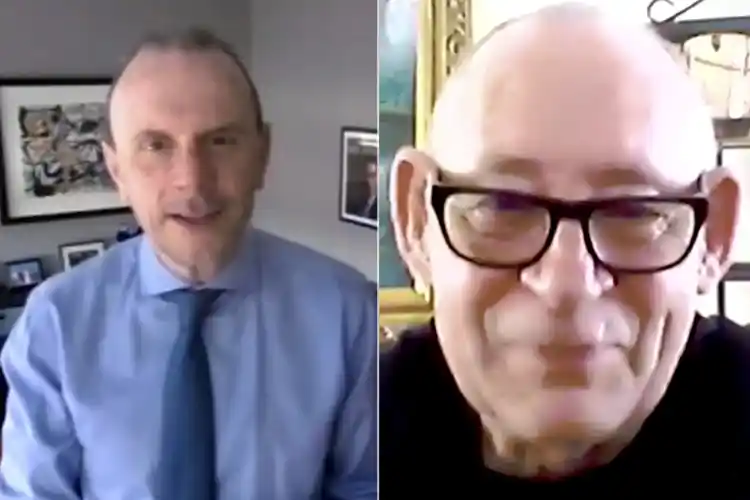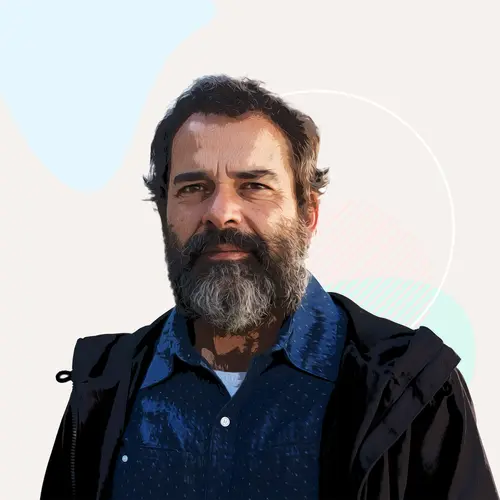Inside the Visit: Immunotherapy

Hide Video Transcript
Video Transcript
[MUSIC PLAYING]
LAWRENCE MORRIS: In the last visit we had, your lymphoma was in complete remission. Compared to before you had the lymphoma and the CAR T therapy, do you think you're 100%, 90%? Where do you think you are?
I had eight rounds of chemo. At the end of the eight rounds of chemo, it had knocked it down but it had not knocked it out. They had a clinical trial that I seemed to fit. It scared the daylights out of me at first but it came out that that's probably going to be the best thing that I could do.
The CAR T infusion itself is not terribly exciting. We admit people routinely at the hospital that first week because if patients are going to have serious side effects from the CAR T therapy, it can last longer than a week, but it's going to happen and it usually starts up during that first week so that's the reason we routinely bring people in and it's hopefully just a long, tedious, boring week without a lot happening.
LAWRENCE MORRIS
Good afternoon, Mr. Gillespie. It's good to see you again. RAY GILLESPIE
Good to see you again, Dr. Morris. LAWRENCE MORRIS: In the last visit we had, your lymphoma was in complete remission. Compared to before you had the lymphoma and the CAR T therapy, do you think you're 100%, 90%? Where do you think you are?
RAY GILLESPIE
I'm probably about 80% as far as my strength and stamina. As far as feeling, I feel fantastic compared to before. LAWRENCE MORRIS
I wonder if we could just go back and just review a little bit about your diagnosis of lymphoma and your initial treatment. RAY GILLESPIE
I had a big lump right where my left leg meets the rest of the body and so I went to my family practitioner and it came back as non-Hodgkin's lymphoma. They had told me what I had but hadn't told me how bad I was until I was in the middle of my first round of chemo. They said, we're going to try to get you three months but we can't guarantee that. I had eight rounds of chemo. At the end of the eight rounds of chemo, it had knocked it down but it had not knocked it out. They had a clinical trial that I seemed to fit. It scared the daylights out of me at first but it came out that that's probably going to be the best thing that I could do.
LAWRENCE MORRIS
The way that we make advances in medicine, it's not just scientists and doctors. Nothing can really happen unless courageous patients like you participate in clinical trials. We knew that the therapy you got, CAR T therapy, could be effective for this kind of lymphoma. I think you got through it very well and so far, so good. Last we checked, you were in complete remission. I wonder if you could just remind me when you were going through CAR T, what that was like for you. RAY GILLESPIE
It was scary because they told me all the things that could go wrong, but then of course they also told me the things that could go right. I felt great and was happy that I decided to do this. LAWRENCE MORRIS
Sometimes CAR T therapy can be a difficult therapy. It doesn't happen that frequently, but it does happen in a certain percentage of patients but there are maybe-- it depends on the CAR T we're using-- up to half of patients who may have very minimal side effects-- no fever, no shortness of breath, no neurologic problems, and fortunately that was you and fortunately so far, the treatments worked out well. RAY GILLESPIE
I think it's done wonders. LAWRENCE MORRIS
Once we established if someone's a candidate, the next step in CAR T therapy is to collect some immune cells from the patients to make the CAR T product. RAY GILLESPIE
They took the cells out of me, sent them off to the lab to have them modified. LAWRENCE MORRIS
After we collect the cells, it takes some time to take your immune cells and manufacture the CAR T products which really means introducing a gene into your immune cells so that they'll fight your cancer. RAY GILLESPIE
You all gave me three rounds of heavy chemo to knock my immune system down so that it didn't attack the new cells that you're going to put back in me. LAWRENCE MORRIS
We're always a little concerned that during that period, the lymphoma could progress and make the patient sick so frequently, we have the patient go back to their referring oncologist and maybe get one treatment just to try to hold the lymphoma in check before the patient comes back for the CAR T infusion. The CAR T infusion itself is not terribly exciting. We admit people routinely at the hospital that first week because if patients are going to have serious side effects from the CAR T therapy, it can last longer than a week, but it's going to happen and it usually starts up during that first week so that's the reason we routinely bring people in and it's hopefully just a long, tedious, boring week without a lot happening.
RAY GILLESPIE
I think about 2 and 1/2 weeks later, you did a biopsy, a bone marrow biopsy and another PET scan and a couple of days later was when you all told me that I was in remission and sent me home. It was a big, big difference from the year before when they told me I only had three months so when you told me I'm in remission, that just made me do a happy dance. LAWRENCE MORRIS
That's great. Yes, you did very well and we were also very gratified to see that when you had your repeat test a few weeks later that you were in complete remission. RAY GILLESPIE
You all weren't any happier than I was. [MUSIC PLAYING] 